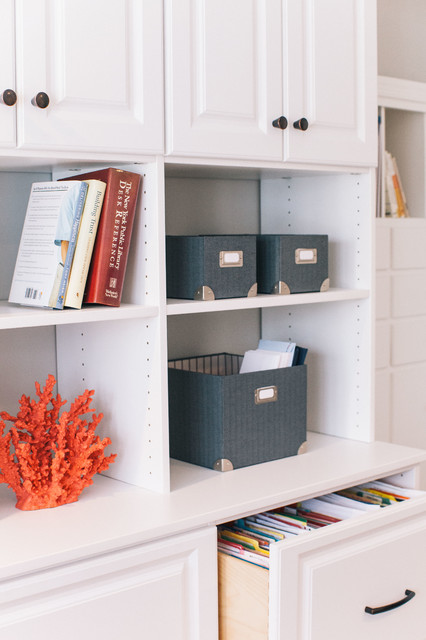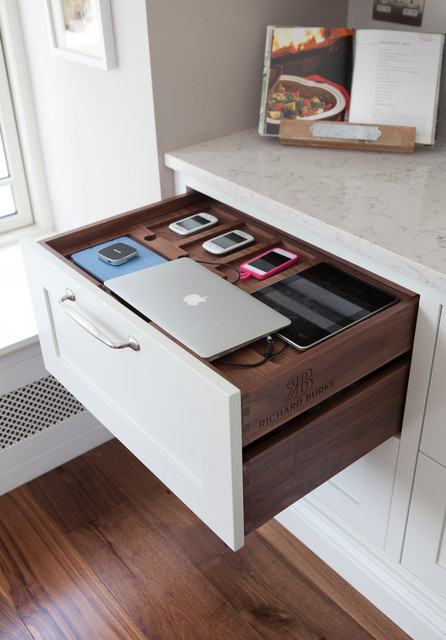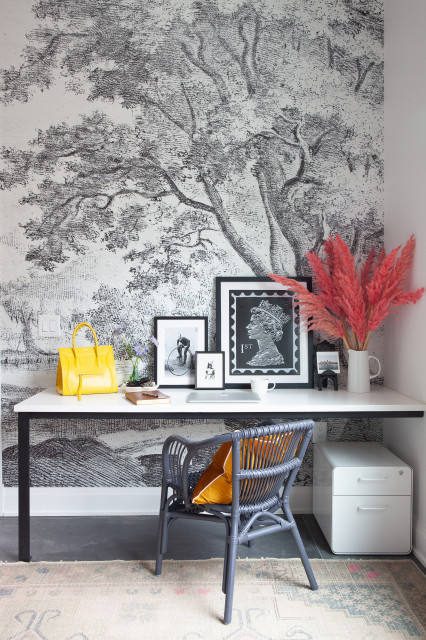How to Pare Down and Pack Up a Home Office for a Remodel
The office is one of the hardest rooms to pare down. Papers can take a long time to sift through to determine if they’re important enough to keep. There may also be an abundance of different office categories that make decluttering overwhelming.
If you have the luxury of time before your remodel, it’s best to break up this task into smaller parts. If your remodel is fast approaching, you may want to at least sort into categories as you pack and trim down items later. If you don’t have time to sort and reduce at all, then pack your items to get the remodel rolling and then commit to a steady schedule of reviewing one box at a time, perhaps with the goal of finishing by the time your remodel is complete.
Create an Office Essentials Box
Life continues during a remodel, which may mean bills need to be paid, letters need to be mailed, passports need to be accessed and cards need to be written.
To remain organized, consider which items you need to access in order to stay on top of your home management. These may include checkbooks, calendars, address books, envelopes, stamps, pens, calculators, insurance information and more. I recommend keeping these items in one container if possible, so everything is on hand and easy to find.
Be sure to keep sensitive and confidential documents in a safe place, especially if there will be many unfamiliar workers coming in and out of your house while remodeling.
Life continues during a remodel, which may mean bills need to be paid, letters need to be mailed, passports need to be accessed and cards need to be written.
To remain organized, consider which items you need to access in order to stay on top of your home management. These may include checkbooks, calendars, address books, envelopes, stamps, pens, calculators, insurance information and more. I recommend keeping these items in one container if possible, so everything is on hand and easy to find.
Be sure to keep sensitive and confidential documents in a safe place, especially if there will be many unfamiliar workers coming in and out of your house while remodeling.
Identify What You Want to Keep in Your Office
It’s inevitable that at some point your office may act as storage for items you don’t know where else to house. It may also be the go-to spot for temporary items such as holiday gifts, store returns and items belonging to other people. It’s fine for you to have many purposes for your office. However, make it intentional and create dedicated spaces for each purpose so that items don’t pile up randomly.
When planning your space, decide which categories (such as extra supplies, photo albums, tax records, books or gifts and wrapping) you want to keep in your office. It may be helpful to write down a list of your categories, as seeing the list may clarify where each group should be stored. Your list may also provide you with a guideline for decluttering, tackling the list one category at a time.

It’s inevitable that at some point your office may act as storage for items you don’t know where else to house. It may also be the go-to spot for temporary items such as holiday gifts, store returns and items belonging to other people. It’s fine for you to have many purposes for your office. However, make it intentional and create dedicated spaces for each purpose so that items don’t pile up randomly.
When planning your space, decide which categories (such as extra supplies, photo albums, tax records, books or gifts and wrapping) you want to keep in your office. It may be helpful to write down a list of your categories, as seeing the list may clarify where each group should be stored. Your list may also provide you with a guideline for decluttering, tackling the list one category at a time.

Reduce and Sort Your Papers
Keep three bags close by for recycling, shredding and trash. The goal is to quickly review each paper and decide if it is “keep” or “not keep.” Once you’ve decided, you can further sort the “keeps” into their proper folders and the “not keeps” into one of the three disposal options above.
The process may go more quickly if you set some rules for yourself. For example, you may decide to shred all receipts older than six months. Or keep only current-month magazines and recycling older ones — even if you haven’t read them.
If you’ve ordered excess holiday cards in the past, you may want to keep just a few from each year and recycle or discard the rest. If you have an abundance of extra envelopes alongside holiday cards, keep some if you need them throughout the year and recycle or donate the ones you won’t be able to use. Envelopes will keep accruing if you order extra cards each year, so be sure you’re not keeping too many and clogging up your space. When recycling papers, keep in mind that many centers may not recycle photo paper or any papers with glitter or foil.
Important papers may require a bit more time and focus to review and ensure you’re keeping proper records. Consult the IRS website for the most updated information on which records you need to keep for your situation and for how long.
Consider whether you want to go paperless for other documents, such as bank statements and utility bills. Setting up a new office may be a great time to reduce paper use and start a new system for managing your documents.
Consider whether you want to go paperless for other documents, such as bank statements and utility bills. Setting up a new office may be a great time to reduce paper use and start a new system for managing your documents.
Pack Office Items in Boxes and Pre-Organize
If you won’t be keeping your current office furniture, such as your desk and file cabinet, you may need to temporarily pack up items until your remodel is complete.
Bankers boxes work well to keep files hanging and organized. They work well for packing and storing other office items as well, and the lid makes it easy to retrieve what you need — compared with opening taped moving boxes. If necessary, you may want to purchase hanging folders and other office storage items so you can start organizing as you pack.
If you know the measurements of your new space, you may be able to purchase storage containers ahead of time. If you’re unsure, I recommend waiting until you know so you can select the appropriate products to create the most efficient and functional space for your needs.
If you won’t be keeping your current office furniture, such as your desk and file cabinet, you may need to temporarily pack up items until your remodel is complete.
Bankers boxes work well to keep files hanging and organized. They work well for packing and storing other office items as well, and the lid makes it easy to retrieve what you need — compared with opening taped moving boxes. If necessary, you may want to purchase hanging folders and other office storage items so you can start organizing as you pack.
If you know the measurements of your new space, you may be able to purchase storage containers ahead of time. If you’re unsure, I recommend waiting until you know so you can select the appropriate products to create the most efficient and functional space for your needs.
Pare Down Office Supplies
Sort your supplies by type — tapes, markers, pencils, pens, sticky notes, notepads and more. Eliminate the categories you don’t use, donating those items if they’re in good, usable condition or tossing them if they’re broken or unusable. Some of these categories may include things your children have outgrown or items that are no longer applicable.
Review the remaining categories you want to keep and toss anything that doesn’t work, such as dried-up markers or brittle rubber bands, then pare down what you may have too many of.
If you have supplies you may need in the future but don’t have an immediate use for, consider the space they’re taking up and whether it makes sense to donate those items to someone who could use them now. You can assess your available storage space and weigh the cost of repurchasing against using the space for something else. Also, consider how likely it is that you’ll actually use those items in the future.
Sort your supplies by type — tapes, markers, pencils, pens, sticky notes, notepads and more. Eliminate the categories you don’t use, donating those items if they’re in good, usable condition or tossing them if they’re broken or unusable. Some of these categories may include things your children have outgrown or items that are no longer applicable.
Review the remaining categories you want to keep and toss anything that doesn’t work, such as dried-up markers or brittle rubber bands, then pare down what you may have too many of.
If you have supplies you may need in the future but don’t have an immediate use for, consider the space they’re taking up and whether it makes sense to donate those items to someone who could use them now. You can assess your available storage space and weigh the cost of repurchasing against using the space for something else. Also, consider how likely it is that you’ll actually use those items in the future.
Gather Old Devices, Electronics and Cords
Gather all of your unwanted electronics and match them to their cords and chargers if possible. If they’re relatively current, there are many online or in-store trade-in options to get some value back. If they’re older and not worth anything, you can contact your local recycling service provider about electronics recycling policies.
If you have an assortment of random cords — like many of my clients do — it may be worth the time investment to identify which cords belong with your current devices and which ones have been separated from their mates and are no longer useful. Discard the useless cords with your other e-waste and commit to labeling future devices and cords so you won’t accrue another box of mystery cords.
Gather all of your unwanted electronics and match them to their cords and chargers if possible. If they’re relatively current, there are many online or in-store trade-in options to get some value back. If they’re older and not worth anything, you can contact your local recycling service provider about electronics recycling policies.
If you have an assortment of random cords — like many of my clients do — it may be worth the time investment to identify which cords belong with your current devices and which ones have been separated from their mates and are no longer useful. Discard the useless cords with your other e-waste and commit to labeling future devices and cords so you won’t accrue another box of mystery cords.
Trim Your Book Collection
Make more space on your shelves by eliminating books you no longer need. Consider not keeping books that have a “shelf life,” such as travel books that can become outdated. You may also want to donate old textbooks, books you’ve already read and don’t plan to reread and books that were gifted to you but aren’t of interest to you.
Review the stack of books you potentially plan to read when you have more time and evaluate whether you’ll realistically be able to read them all or whether you may be able to get rid of a few.
Make more space on your shelves by eliminating books you no longer need. Consider not keeping books that have a “shelf life,” such as travel books that can become outdated. You may also want to donate old textbooks, books you’ve already read and don’t plan to reread and books that were gifted to you but aren’t of interest to you.
Review the stack of books you potentially plan to read when you have more time and evaluate whether you’ll realistically be able to read them all or whether you may be able to get rid of a few.
When it comes time to inhabit your office again, replace items thoughtfully and save the best real estate for items you use the most. Foster a balance between form and function so your new office is a place that will inspire you to do your best work.







Comments
Post a Comment